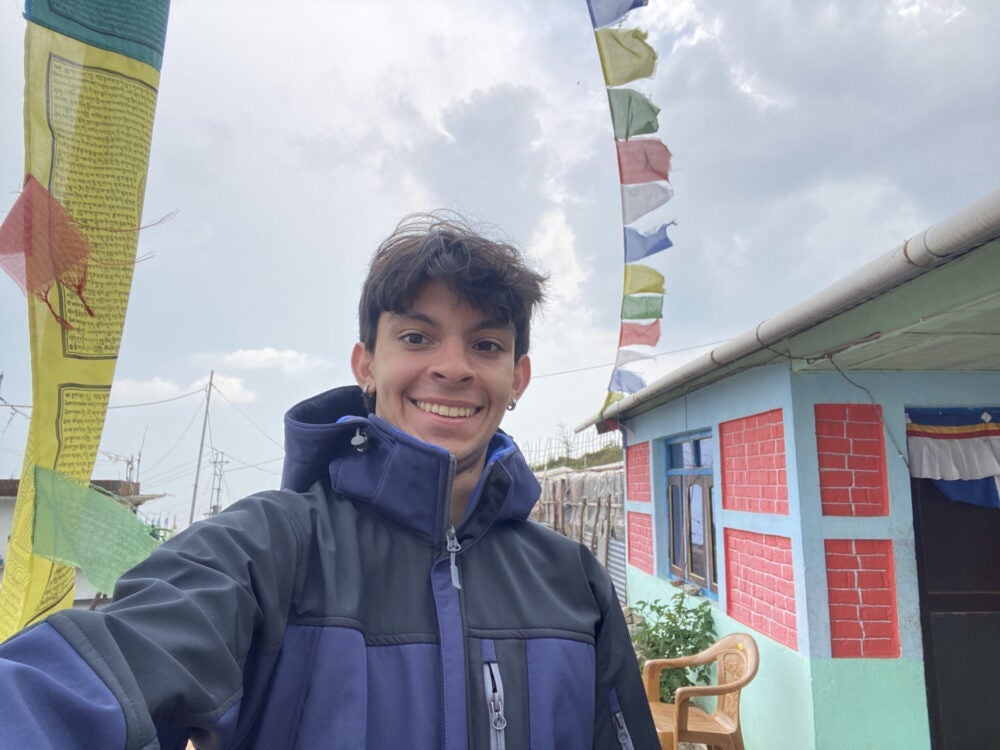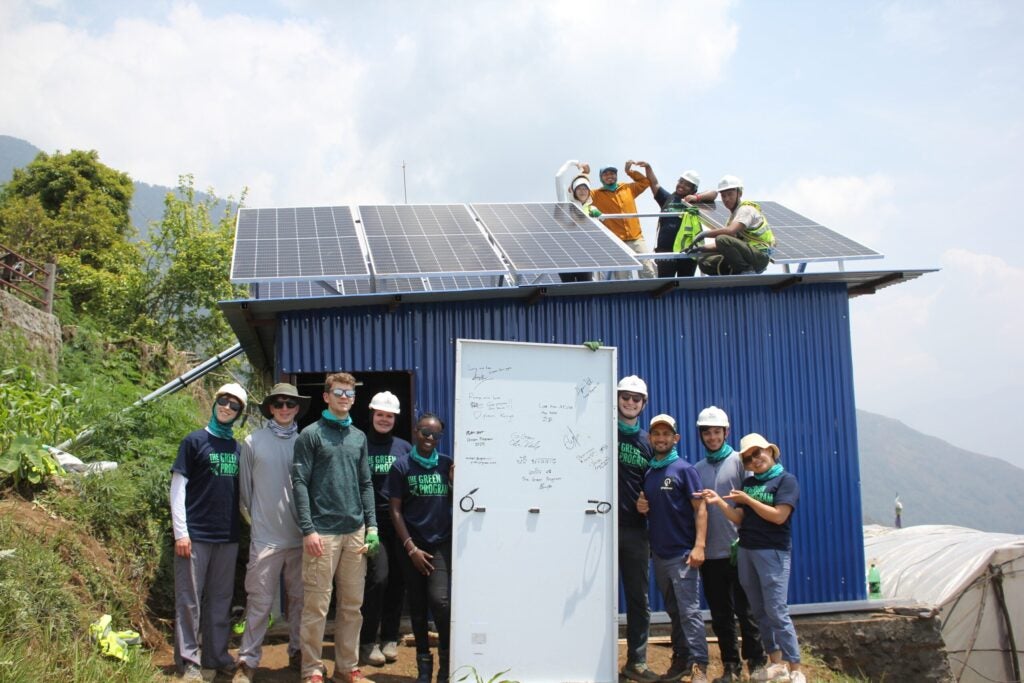
KINGSTON, R.I. – May 05, 2025 – There is a quote from an unknown railroad engineer from India that inspired Cristian Varela, ’26, to pursue a career in engineering — “I am an Engineer. I serve mankind by making dreams come true.”
“I really believe this,” said Varela, who is majoring in industrial and systems engineering and Chinese at the University of Rhode Island. He sees engineers as “the best agents for change. Their work can impact anyone, from a single person to an entire country. I was very interested in humanitarian engineering and how engineering can be tailored for everyone.”
The idea of pursuing engineering within an international context came naturally to Varela. He knew he wanted to do something on an international scale and always admired the ideals behind the United Nations and UNESCO. As a child from Staten Island, New York, who grew up frequently visiting family in Colombia, he became aware early on of how deeply engineering projects affect communities around the world. He saw a two-hour drive up a mountain in Colombia become 45 minutes by cable car, creating better access to education, healthcare and opportunities. “That type of infrastructure and innovation can truly change lives,” said Varela.

URI’s International Engineering Program and the Peace Corps Prep Program inspired him to apply to the College of Engineering at URI. “I really wanted to add an international component to engineering and the opportunity to learn a language, study abroad and have a Peace Corps Prep Program,” said Varela. “I didn’t see that combination offered at many other schools.”
Upon application, Varela was eligible for a Thomas M. Ryan Scholars Award, a full-ride, highly selective scholarship open to all majors. Out of a pool of over 25,000 applicants, he was one of eight to receive the award. Candidates participate in campus visits and a series of interviews to be chosen. Selectees must prove ambition and be high achievers that exemplify the university motto to think big. “The Ryan Scholarship gave me a lot of opportunities, but also the privilege to focus solely on my education and my dreams,” said Varela.

Freshman year, he met with faculty even before the first day of classes. Varela said that his professors and advisors have all “guided me and supported me since day one and it makes a real impact.
He enrolled in the International Engineering Program majoring in industrial and systems engineering and Chinese. “I selected Chinese because I always wanted to learn a third language and I wanted to challenge myself. I am a big fan of Chinese mythology and philosophy so URI offering Chinese was an incredible combination,” said Varela.
Varela lived with the engineering living and learning community his first year. He participated in intramural sports and won four titles with the “Afronation” team. He is also a member of student organizations Brother on a New Direction , Institute of Industrial and Systems Engineers and Theta Tau fraternity. “One of my best memories is winning the Rainville Award for Team Excellence in 2024 with B.O.N.D.” adds Varela.

He is currently a Chinese IEP ambassador, international center global peer ambassador and College of Arts and Sciences peer mentor. “I think what differentiates URI the most is the number of opportunities available and how willing and open everyone is to help you achieve a goal. Every professor, club, and student are working on something special; it’s very easy to get involved,” said Varela.
“B.O.N.D. has helped shaped me into the person I am today.”Cristian Varela
He also found unique opportunities to explore different cultures and experiences on campus. H.E. Kundeling Rinpoche, a highly recognized Tibetan and Buddhist Lama, came to URI to discuss how to become a positive global citizen based on universal human values. “I was one of the few students that went, but it’s a story I tell and an experience I don’t think many others can match when talking about their experiences. I walked away with a lot of lessons on how to approach everyday life. I try and apply them every day. Another time I went to a Diwali dinner with my friends on-campus and celebrated it for the first time. I imagine I will continue to celebrate it for a while,” said Varela.


Varela with H.E. Kundeling Rinpoche, a highly recognized Tibetan and Buddhist Lama at URI
He joined the International Engineering Program Living and Learning Community sophomore year to further engage in global prospects. Residents share common rooms supporting a culture of language learning and an exclusive dining hall serving international cuisine.
For his first internship June 2023/Sophomore summer/, he journeyed to Colombia to study agricultural engineering and scalability at Equilibria Agro. Following that, he spent a J-term in Indonesia studying biodiversity, geology and water resources.

He was accepted into the Natural Hazards Engineering Research Infrastructure (NHERI) in 2024, a National Science Foundation (NSF) Research Experience for Undergraduates (REU) summer program in multi-hazard engineering and interdisciplinary research sites. Varela spent 10 weeks at University of California, Berkeley at the SimCenter modeling evacuation procedures in coastal areas during water based natural hazards.
In 2024, he traveled to Nepal with The Green Program, a short-term sustainability study abroad. These experiences eventually culminated with landing a coveted spot with the United Nations Institute for Training and Research Global Diplomacy Initiative Fellowship Program, which provides students a chance to learn diplomacy and its applications from experienced diplomats and experts.
“My dream for the longest time has been to be a humanitarian engineer for the United Nations and being accepted to the GDI program was for me a highlight of my time at URI and the acceptance email is something I’ll cherish for a long time,” said Varela.

The GDI program is comprised of three-hour courses, held once a week for three months, twice a year taught by distinguished Ambassadors and high-level UN Officials, providing participants with insights from individuals actively shaping the international stage.
Varela will then prepare for an internship at Universitas Islam Indonesia, in Yogyakarta, Indonesia, this summer to study lithium in geothermal power systems. His last year as an undergraduate student will be spent abroad in Taiwan for his fifth year IEP internship and work study.
His passport is certainly filling up, but Varela substantiates he is going far in more ways than one.
“I think what differentiates URI the most is the number of opportunities available and how willing and open everyone is to help you achieve a goal.”Cristian Varela

This story was written by Krysta Murray for the College of Engineering.
